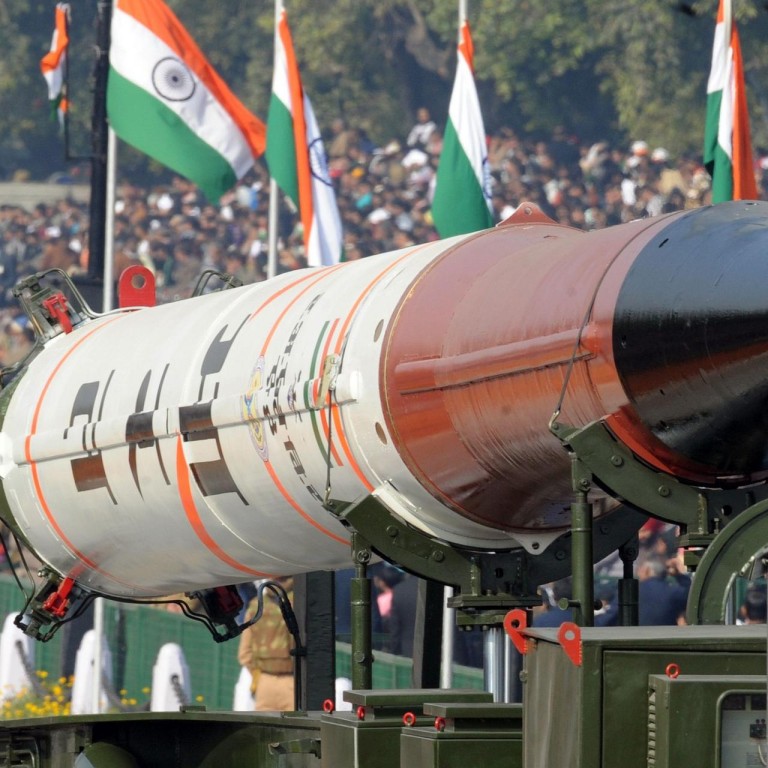
Pakistan out to expand nuclear arsenal with sea-based and short-range rockets
International concern grows at development of sea-based missiles that offer a chance of a second strike if land-based weapons are destroyed
In one of the world's most volatile regions, Pakistan is advancing towards a sea-based missile capability and expanding its interest in tactical nuclear warheads, according to Pakistani and Western analysts.
The development of nuclear missiles that could be fired from a navy ship or submarine would give Pakistan "second strike" capability if a catastrophic nuclear exchange destroyed all land-based weapons.
But the acceleration of Pakistan's nuclear and missile programmes is renewing international concern about the vulnerability of those weapons in a country home to more than two dozen Islamist extremist groups.
"The assurances Pakistan has given the world about the safety of its nuclear programme will be severely tested with short-range and sea-based systems, but they are coming," said Michael Krepon, co-founder of the Stimson Centre, a Washington-based global security think tank. "A cardinal principle of Pakistan's nuclear programme has been: 'Don't worry; we separate warheads from launchers.' Well, that is very hard to do at sea."
Western officials have been concerned about Pakistan's nuclear programme since it first tested an atomic device in 1998. Those fears have deepened over the past decade amid political tumult, terror attacks and tensions with the country's nuclear-armed neighbour, India, with which it has fought three wars.
That instability was underscored this month, as anti-government protests in the capital appeared to push Prime Minister Nawaz Sharif's government to the brink of collapse. The crisis was unfolding as Pakistan and India continued lobbing artillery shells across their border, in a tit-for-tat escalation that illustrated the risk of another war.
For more than a decade, Pakistan has sent signals that it's attempting to bolster its nuclear arsenal with "tactical" weapons — short-range missiles that carry a smaller warhead and are easier to transport.
Over the past two years, Pakistan has conducted at least eight tests of various land-based ballistic or cruise missiles that it says are capable of delivering nuclear warheads. Last September, Sharif, citing "evolving security dynamics in South Asia", said Pakistan was developing "a full spectrum deterrence capability to deter all forms of aggression".
The next steps in Pakistan's strategy include an effort to develop nuclear warheads suitable for deployment from the Indian Ocean, either from warships or from one of the country's five diesel-powered navy submarines, analysts say. In a sign of that ambition, Pakistan in 2012 created the Naval Strategic Force command, which is similar to the air force and army commands that oversee nuclear weapons.
"We are on our way, and my own hunch is within a year or so, we should be developing our second-strike capability," said Shireen Mazari, a nuclear expert and the former director of the Institute of Strategic Studies Islamabad, a hawkish Pakistani government-funded think tank.
Pakistan's nuclear push comes amid heightened tension with US intelligence and congressional officials over the security of its nuclear weapons and materials. reported in September 2013 that US intelligence officials had increased surveillance of Pakistan in part because of concerns that nuclear materials could fall into the hands of terrorists.
State Department spokeswoman Jen Psaki said it was up to Pakistan to discuss its programmes and plans.
But she said: "We continue to urge all nuclear-capable states to exercise restraint regarding nuclear and missile capabilities. We continue to encourage efforts to promote confidence-building and stability and discourage actions that might destabilise the region."
Analysts say much about Pakistan's programme remains a mystery. Western experts, for example, are divided over whether Pakistan has the ability to shrink warheads enough for use with tactical or launched weapons.
"They may have done so, but I can't imagine it's very reliable," said Jeffrey Lewis, a nuclear and non-proliferation scholar at the Monterey Institute of International Studies. Still, Lewis and other analysts say Pakistan is without doubt embarking on an ambitious, multi-year strategy to enhance its nuclear arsenal and delivery systems.
Rizwan Akhtar named head of Pakistan's ISS intelligence agency
Pakistan has appointed Rizwan Akhtar, considered a close ally of the army chief, to head the country's powerful intelligence agency, the military's press wing said yesterday.
The head of the Inter-Services Intelligence spy agency occupies one of the most important posts in Pakistan, at the intersection of domestic politics, the war on militancy and Pakistan's foreign relations.
Although the ISI officially reports to the prime minister, in reality it is controlled by the army chief, General Raheel Sharif.
Akhtar's previous job was head of the paramilitary Rangers in southeastern Sindh province. He is considered to have extensive experience of counterinsurgency from a previous posting in the border region of South Waziristan.
He will take over on October 1.
"He [Akhtar] is a horribly straight guy, all black and white," said a military official who has served with Akhtar. "He has served in a place like Karachi while remaining neutral and apolitical and has extensive experience of counterinsurgency and counterterrorism. He was the obvious choice."
